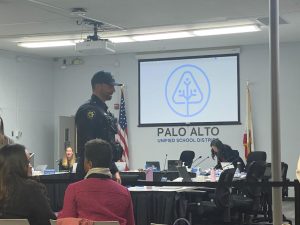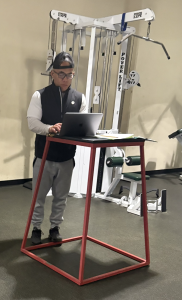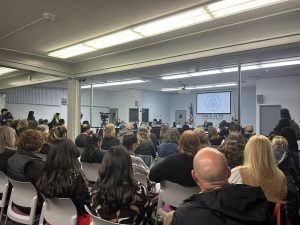Science teacher opens up on mental health journey
June 1, 2023
“In a world where you can be anything, be kind,” reads a sign tacked on the bulletin board at the front of Palo Alto High School science teacher Elizabeth Brimhall’s classroom. The graphic depicts a smiling globe, surrounded by a ring of young children holding each other’s hands.
The colorful poster is one of many decorations across the wall of Brimhall’s room that promote positivity, kindness and community in the learning environment. Brimhall’s approach to uplifting her students is a result of her own experience dealing with mental health, after being diagnosed with depression a few years ago.
Instead of giving into the struggle, Brimhall said she has resolved to turn her pain into an opportunity to make an even greater difference in her students’ lives. Brimhall hopes to foster a friendly, wholesome atmosphere in an effort to encourage students to be more open about their mental health with their teacher.
Brimhall said she reached out to The Paly Voice in hopes that sharing her personal struggles would impact readers to make a change.
“I want to shine a light on mental health and tell my story [so] it can inspire our community to greater action,” Brimhall said.
Brimhall’s journey navigating depression and bipolar disorder, in which she dealt with symptoms of mania and over-excitement, began amid the pandemic. According to Brimhall, the limited social interactions as a result of shelter-in-place restrictions were a primary reason for her mental decline.

When schools reopened to be in-person for the 21-22 school year, Brimhall continued to struggle with her mental health while balancing her work and personal life.
“I could still go to work and battle through my days, but basically then came home and crashed most nights,” Brimhall said.
It was then in April last year that Brimhall began showing signs of hypomania, where she would find herself overly hyper and active during spontaneous episodes. After being diagnosed with bipolar disorder, Brimhall said she found it difficult to believe what was happening.
“When I found out that I myself was having [mental health issues], it was really hard,” Brimhall said. “To have this hit me was not something I expected.”
As her other friends and family had previously struggled with their own mental health, Brimhall said finding herself in their situation was a new experience.
“I’ve had many friends who’ve dealt with mental health issues,” Brimhall said. “It was interesting that during COVID, because of the weirdness of the world and what happened to a lot of people, now I’m dealing with [mental health struggles] myself, and so I’m learning to navigate that.”
Despite seeking help from several medical professionals, Brimhall said she was frustrated by the lack of available mental health resources, both for herself and for others.
“The biggest challenge is just getting the services I need,” Brimhall said. “I worry about students that maybe don’t have those resources, or families who are trying to navigate our medical system that is really hard.”
Brimhall said she hopes the process of receiving treatment will improve, which will allow more people to find help earlier on when dealing with mental health issues.
“If we’re waiting for everyone to be in crisis, that’s really hard,” Brimhall said. “It’s like saving everyone from falling off the edge of the waterfall. We’d love to get [treatment] much more upstream. That’s what’s really hard with this system as it is currently.”
According to Brimhall, the COVID pandemic may be over, but people across the world are still dealing with the aftermath and the toll it took on their mental health.
“It’s an unprecedented time we are in, and this mental health pandemic really concerns me,” Brimhall said. “We need to marshal as many resources for it as we did for COVID, and I don’t see that happening on a local, state and national level.”
Along with her challenge to find sufficient mental health resources, Brimhall said she must be mindful of the behavior she brings to class and the way she treats her students.
“It’s a little bit of ‘fake it until you make it’—you put a smile on your face and you go to your job,” Brimhall said. “It’s a little bit of an acting performance.”
According to Brimhall, her students have always had a positive impact on her mental health, which is something she is grateful for.
“The lovely thing about my job as a teacher is that the students in the room give me a lot of energy,” Brimhall said. “When I’m depressed and walk in, sometimes I have to force the first smile but then after that, I move to my teaching and that’s always joyful for me. I’m really lucky that I have a job like that.”
Another positive outcome of Brimhall’s mental health journey is allowing her to empathize more strongly with Paly students going through a similar situation. Brimhall said having a deeper, more personal understanding of mental health issues has caused her to be more supportive and encouraging to her students.
“I know how hard it is when I look at my students who I know are maybe struggling to be here,” Brimhall said. “I just try and share with them how happy I am that they’re there. It’s not always easy to remember, but I’m trying to remember that as a teacher.”
Brimhall said she hopes others across the community will share their own stories and experiences dealing with mental health, which she believes will lead to further unity.
“The biggest thing I want to say is that I’m not alone in trying to kind of focus a lens on these issues,” Brimhall said. “The Surgeon General of the United States just published an article in The New York Times about loneliness and his own struggles. So, I think more and more people are wanting to talk out and say we need to come together as communities.”
It’s not the end of the journey, Brimhall said, but the beginning of raising awareness and sharing stories with each other. Brimhall hopes to inspire action to promote inclusivity among the neurodiverse community.
“What can we do about the mental health pandemic we are mired in, and how can we make a difference?” Brimhall said. “This is the problem I want us to dig into as a community. To the extent that we can realize neurodiversity is not going away, maybe we can all work together to make for a better future.”







